The Ukrainian state is dealing with Crimean problems too slowly and often reluctantly due to its sluggishness, bureaucratic procedures, and sometimes a real sabotage of people in power. Therefore, the civil society activists took the initiative in developing the de-occupation strategy and protecting the rights of Crimean people on both sides of the administrative border.
De-occupation strategy and protection of Crimean people
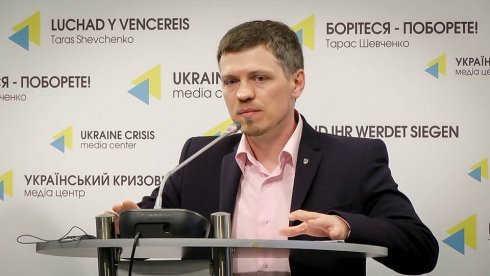
The Evromaidan-Krym Head Sergey Mokrenyuk
The most important role in developing the Crimean civil society has played the Evromaidan-Krym movement that has only recently acquired the status of a non-governmental organization, but its founders play a central role in discussing and resolving the issues of occupied Crimea today. Although the organization’s aim is set as “ensuring and protecting the rights of Crimeans on the peninsula and the mainland”, the head of the organization Sergey Mokrenyuk considers “the development of own content for the future of Crimea as an integral part of Ukraine” as one of the most important goals of his activity.
The formulation of the de-occupation strategy and the post-occupation development of Crimea along with the protection of rights of Crimean people are among the main goals of the human rights group for Crimean issues “20 Fevralya” headed by the ex-minister of Tourism and Resorts of the Autonomous Republic of Crimea Aleksandr Liev. However, the activists of this organization still can’t show real results of their activities.
The rights of Crimeans: from monitoring to ensuring
Some non-governmental organizations focused their activities exclusively on the protection of human rights both on the mainland Ukraine and in annexed Crimea to the extent possible.

The Coordinator of the Crimean human rights group Olga Skripnik
According to the information on the website of the Crimean human rights group, this organization is mainly engaged in monitoring and information activities: the experts collect information about human rights violations on the occupied peninsula, disseminate this information in the mass media and among international human rights institutes.
The non-governmental human rights organization “Syla prava” aims to help the victims of the Russian aggression in Crimea and on the East of Ukraine to get compensation from the aggressor-country. As for now, the lawyers of the organization have proved the fact of Russian aggression against Ukraine and achieved a judgement to arrest the “loan of Yanukovich” – $3 billion taken from Russia in 2013. According to the organization’s coordinating council member, ex-people’s deputy of Ukraine Andrey Senchenko, these funds should be used for paying compensations to victims of Russian actions – to the military, IDPs and others.
The lawyers of the Crimean office of the Ukrainian Helsinki Human Rights Union are actively involved in protecting the rights of internally displaced persons on the mainland Ukraine.
“Our office has provided 713 consultations and prepared more than 50 suits of citizens based on violations of their rights only during the first 9 months of this year, and the office’s lawyers handle 15 cases,” the lawyer of the Crimean office Anna Rassamakhina says.
According to the human rights defender, the most serious problem existing in the political and legal field of Ukraine today is the regulations that don’t allow to implement provisions of laws. “The executive branch of the government simply takes no responsibility for implementing laws. We are trying to create a precedent that will help to overcome this negative effect,” the lawyer explains.
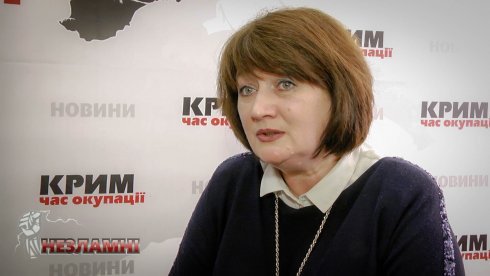
The Coordinator of educational programs of the Center for Civic Education “Almenda” Valentina Potapova
The Center for Civic Education “Almenda” founded in Crimea before the occupation and reopened on the mainland Ukraine is currently dealing with the problem of education opportunities for the residents of occupied Crimea on the mainland. The active efforts of the coordinator of Center’s educational programs Valentina Potapova allowed to launch the distance learning courses and external studies throughout Ukraine for children from occupied territories as well as to introduce preferential procedures for Crimeans to enter higher education institutions of mainland Ukraine.
IDPs: from aid to creating educational centers
Resolving the problems of IDPs is a main task of the public initiative “KrymSOS” having now 5 offices (in Kiev, Kherson, Lvov, Poltava and Zaporozhye) and represented in 17 regions of Ukraine.
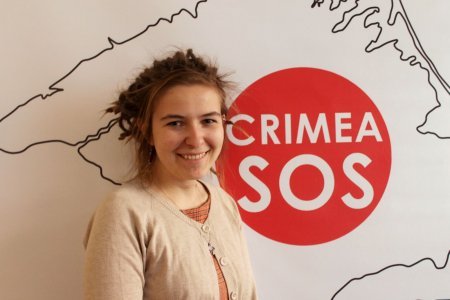
The KrymSOS Coordinator Evgeniya Andreyuk
According to the coordinator of the organization Evgeniya Andreyuk, “KrymSOS” started from the page in Facebook social network to provide the relevant information about events in Crimea since the peninsula’s occupation by Russia. Then activists began to help the blocked Ukrainian military, then the internally displaced persons from Crimea and the East of Ukraine. “We have gradually transformed into a multipurpose organization working with the aim of de-occupation of Crimea and systemic solutions to problems caused by the military conflict in Crimea and on the East,” Evgeniya explains.
The “KrymSOS” is really involved in activities of different kinds – from providing the legal and humanitarian aid (in the amount of 8 mln hryvnas via different programs for two years) up to free English language learning courses.
According to the coordinator, about 200 thousand IDPs from Crimea and the Donbass have obtained support of various types via the organization, about 30 thousand legal consultations have been provided, 1,000 families have got the housing assistance and about 100 business initiatives of IDPs have been supported for two years of their work.
The organization “Krymskaya diaspora” established on the initiative of Crimean internally displaced persons in 2014 is focused on cooperation with the Ukrainian government and international donors to address problems of IDPs. Therefore, organization’s activities has a lot of results: from conducting business trainings for IDPs to opening a school of family type in the capital of Ukraine.
Expertise and information work and ethnic problem
The fund “Maidan of Foreign Affairs” that poses itself as “an expert and civil platform in foreign policy” should be included to the list of expert organizations dealing with Crimean issues among others. One of the main achievements of the fund is the development of “The strategy of de-occupation of Crimea”, which is still the only one in Ukraine. The fund experts prepare analytical materials, give comments to the media willingly and deliver lectures on Crimean issues.
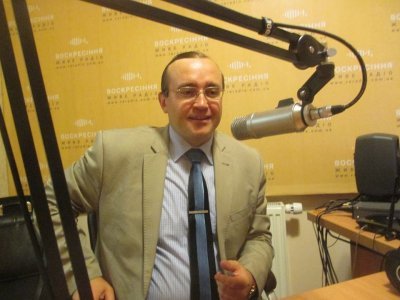
The Coordinator of the Taurida Humanitarian Platform Andrey Ivanets. Photo from social networks.
The “Taurida Humanitarian Platform” was established in Crimea to develop humanitarian relations between Crimea and other regions of Ukraine in 2013. According to the coordinator of the organization Andrey Ivanets, when they have moved to the mainland after the occupation, the activists focused their attention on protecting the rights of IDPs and holding historical and educational activities in the regions of Ukraine, including a telethon “The Day of Ukrainian Sea” on UkrLife TV channel, a series of lectures about the relationship between Crimea and Ukraine in 1917-1918 and consultations on Crimean issues.
The Crimean Tatar Resource Center as a non-governmental organization established to “increase the level of political and public activities of Crimean Tatars, promote the protection of rights and freedoms of the Crimean Tatar people” takes a special place among other non-governmental organizations. However, they haven’t provided us with the information on how this organization protects these rights.
Crimean problem: between the state and society
There are several key issues among problems the civil society activists face with: the state and the society don’t have a unified approach to the Crimean problem, it is difficult to communicate with public institutions, and financial and human resources are distributed among organizations in an uneven manner.
“One of the major difficulties is a lack of a systematic state and public policy regarding the occupied territories and IDPs. Today they take one measures and tomorrow – the measures contrary to the taken ones. We lack a common goal for government agencies and the public sector,” the KrymSOS coordinator Evgeniya Andreyuk says.
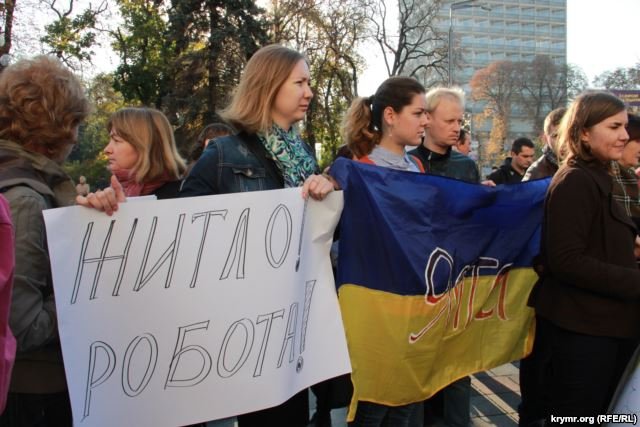
The meeting of IDPs in front of the building of the Verkhovna Rada of Ukraine
The Evromaidan-Krym head Sergey Mokrenyuk considers the Crimean problem as a complicated issue, which doesn’t have simple solutions.
“There is no single approach like #zrada or #peremoga. Therefore many issues are complicated for the society,” he says.
In addition, according to Mokrenyuk, the civil society activists have to be torn between the work, their families and social activities. “At the same time, some organizations with almost unlimited resources filled the information space with low-quality, contradictory and sometimes even harmful information,” he sums up.
In order to consolidate the efforts of non-governmental organizations that unite IDPs, the public union “Coordination Council of NGOs of IDPs from Crimea” including 15 non-governmental organizations and charitable funds established by Crimean IDPs was created in 2014.
According to the co-coordinator of the union Andrey Schekun, by joining their efforts, Crimean social activists got things moving to creating a state structure that would deal with issues of the occupied peninsula – the Ministry of Temporarily Occupied Territories and Internally Displaced Persons. Although, the activist says that this structure still don’t function properly.
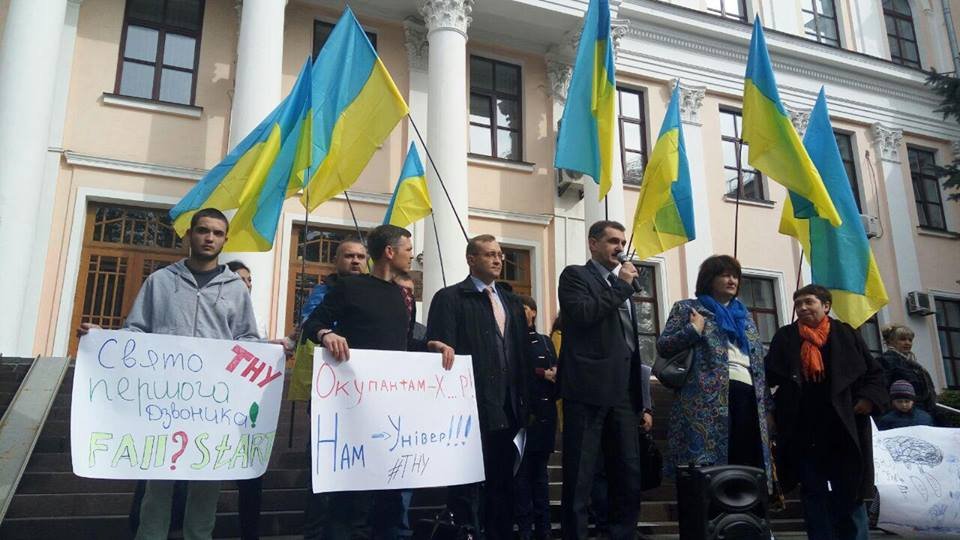
The meeting of Crimea social activist to support the Taurida National V.I. Vernadsky University. Photo from social networks
“We held a meeting regarding the TNU not so long ago and got a relevant resolution of the Cabinet of Ministers on functioning of the only Crimean university on the mainland Ukraine adopted. Previously, we contributed into creating the interfactional association “Krym” in the Verkhovna Rada. It is possible that it doesn’t always fulfil its mandated functions, but this is our opportunity to influence the deputies,” Schekun give the assessment of the results of public sector activities.
Despite the fact that Crimean social activists don’t have real levers of power in their hands, they contribute to processes of de-occupation of Crimea much more systematically than the state. However, the process of returning the peninsula to Ukraine will start not when Putin leaves the Kremlin, but at the moment, when the Ukrainian government in cooperation with civil society activists develop and begin to implement a consolidated strategy for reintegration of Crimea.
Olga Efimova









